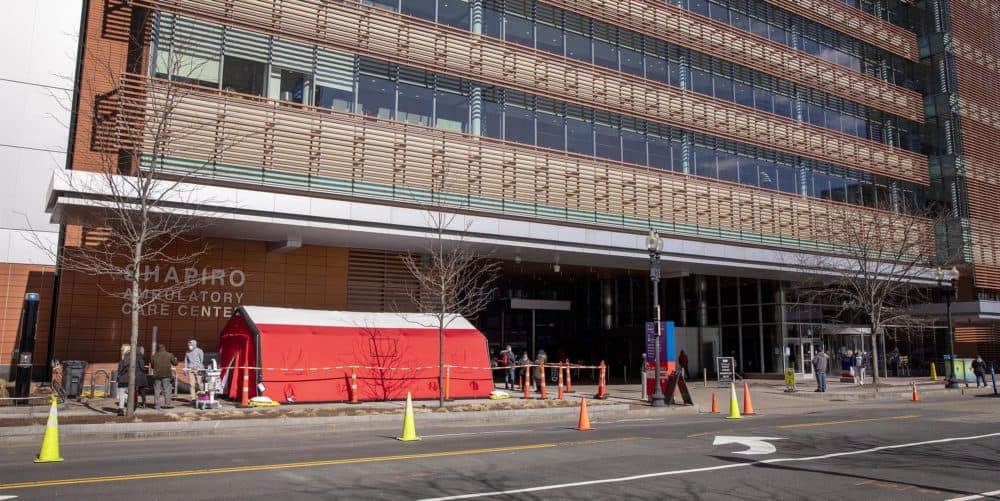Advertisement
Coronavirus Coverage
Major Boston Hospitals Are Virus Testing Pregnant Patients Arriving To Give Birth

Major hospitals across Greater Boston have a new admissions step for patients who arrive in early labor: a coronavirus test.
Most hospitals already had its workers meet pregnant women and some trans men at the entrance before then directing those with symptoms to isolation rooms. Now, a diagnostic nasopharyngeal swab is part of admissions for all patients admitted for delivery — whether they have symptoms or not — at many of the state’s largest maternity care facilities.
Boston Medical Center started universal testing on Monday for patients giving birth there. Tufts Medical Center began this past weekend. Beth Israel Lahey Health issued universal testing guidance to member hospitals late last week. . And four Partners HealthCare hospitals launched universal testing in mid-April.
Hospitals accelerated this effort after reading a letter from doctors at two hospitals in New York published in the New England Journal of Medicine. Among 215 women who delivered infants in late March and early April, 13.7% were positive but did not have any symptoms.
If the same held true in the Boston area, then labor and delivery staff were spending a lot of unprotected time in very close range with women who could be unwittingly spreading the coronavirus. Maternity staff do not always wear N95 masks and other protective gear during labor and delivery unless the patient is known to be positive.
“Out of an abundance of caution, we wanted to be sure that we would identify these patients,” said Dr. Ilona Goldfarb, “and also prepare the family to appropriately protect the baby and take care of the baby after birth.”
Hospitals that can test all labor and delivery patients have a tool others don’t: the ability to deliver rapid results.
Goldfarb, the COVID-19 lead for the Massachusetts General Hospital obstetrics department, said MGH and three other Partners hospitals, Brigham and Women’s, Newton-Wellesley and North Shore Medical Center can learn if a patient is positive in about two hours.
At Tufts Medical Center, the turnaround time is now 60-90 minutes. Just a few weeks ago it was 12 hours, explained Dr. Margaret Sullivan, an OB-GYN at that hospital.
“Before it didn’t make clinical sense,” she said, “because some moms would deliver before the results came back.”
Dr. Neel Shah, an OB-GYN at Beth Israel Deaconess Medical Center, said the numbers out of New York make a strong case for running a diagnostic test on all patients who are admitted for delivery. But slower test processing is still the hold-up at some hospitals.
“The challenge is that our testing capability is limited and varies considerably by hospital,” said Shah, who is also director of the Delivery Decisions Initiative at Ariadne Labs. A spokeswoman for the BILH network said it typically takes six to eight hours to get a coronavirus test result, although a rapid test is available when the result would change the patient’s care.
And policies vary too. Some hospitals only conduct one test to determine that a patient is negative, but Shah said most hospitals require two negative tests to make sure the patient does not have COVID-19, which takes extra time.
“With limited PPE [personal protective equipment] and limited COVID rooms, and with the realities of labor and delivery [people in labor can progress and deliver rapidly], definitively testing everyone is not always possible,” he said.
It’s too early to say if Boston will find rates of positive, asymptomatic women giving birth in the same range as the two New York hospitals. In one week of testing, MGH has found three women who tested positive but didn’t show any signs of the coronavirus. That’s out of as many as 50 patients.
“With limited PPE and limited COVID rooms, and with the realities of labor and delivery, definitively testing everyone is not always possible."
Dr. Neel Shah
At MGH, Goldfarb said women who’ve tested positive and are sick follow the same precautions to protect their infants as do women who are asymptomatic. Newborns are allowed in the same room as their parent, but at a distance of six feet.
Goldfarb said the goal is “teaching the mother and the family how to use good hand hygiene, how to wear a mask, how to care for the baby as safely as possible knowing that mom and baby and family were going to be in the home together in short order.”
That care includes breastfeeding. Goldfarb said so far there are no cases where the coronavirus has been detected in breast milk. She advises mothers who are positive to wear a mask when feeding, change into a clean gown, and pay close attention to hygiene. MGH prepares packages of PPE to send home with these families. Goldfarb said it’s best if a healthy person handles most of the baby’s care until the mother is no longer infectious.
At Tufts Medical Center, in contrast, babies are placed in the NICU if the mother tests positive for the coronavirus.
Sullivan said the Tufts policy is that babies can have breast milk if the mother pumps and someone else feeds the infant. Sullivan stressed that all of these policies are subject to change as obstetricians learn more about the coronavirus and as the number of patients who test positive increases.
What might happen for example, asked Sullivan, if mothers who are asymptomatic refuse to be separated from their new babies?
“It’s a very fluid situation,” she said.
This article was originally published on April 28, 2020.
